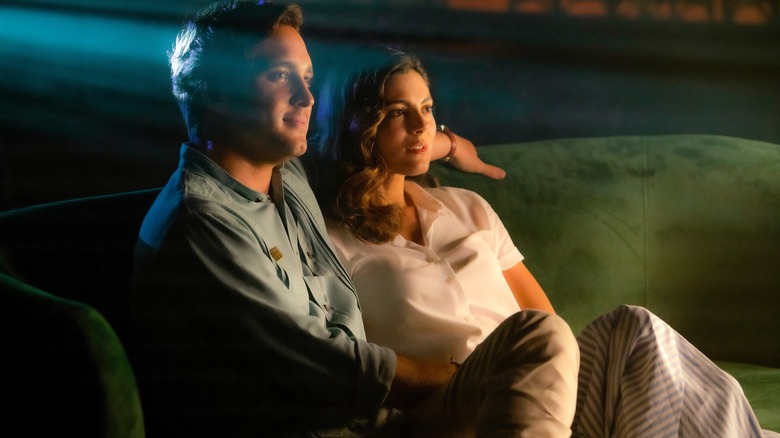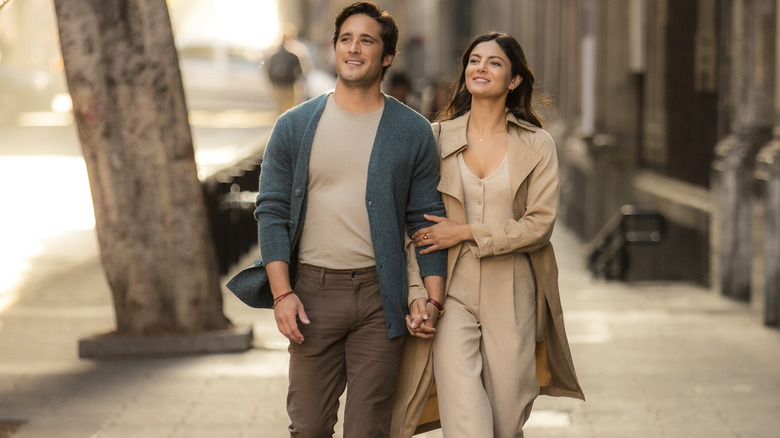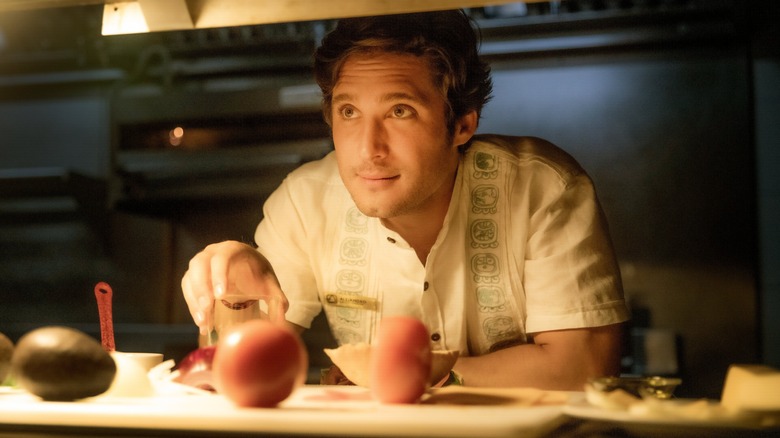At Midnight Review: A Charming But Familiar Rom-Com Runs Out Of Time
During the mythical Golden Age of Hollywood, the romantic-comedy genre could be relied upon as a consistently entertaining, star-studded, and profitable performer at the box office, year in and year out. We've fallen quite a long way in the years since despite some recent breakthrough hits like "Crazy Rich Asians" or last year's double-whammy of "The Lost City" and "Ticket to Paradise." Instead of studios going out of their way to court genuine movie stars and put their charisma and charm on display for moviegoing audiences to enjoy vicariously, we've ended up in a place where those once-ubiquitous theatrical features instead struggle to justify their existence ... if they even make it to theaters at all.
That brings us to "At Midnight." On the surface, it has all the makings of a much-needed throwback date night at the movies, in the vein of "Roman Holiday" before it (which gets a shout-out in the film). Although the co-leads aren't necessarily the most well-known quantities here, their tangible chemistry, the classic premise of a movie star falling for a humble everyman, and the film's self-effacing nostalgic streak all combine to make a poignant and admirable statement: Rom-coms aren't dead, if only we could look back and remember why we love them so much in the first place. Of course, the fly in the ointment comes from the fact that "At Midnight" will release straight to streaming on Paramount+, which makes it much harder to find an audience and somewhat clashes with the film's main promotional image of co-stars Diego Boneta and Monica Barbaro enjoying a romantic outing at — where else — the movies.
Admittedly, films have a much longer shelf life than the mere circumstances of their release. But for a story so concerned about reconciling the history of the genre with its contemporaries, that glaring irony sets the tone for what follows. "At Midnight," for all its commendable aspirations to be something more, can't help but feel caught in a much greater identity crisis than any of its characters face. What we're left with is a charming picture that, like its own characters, struggles to win its race against time.
What you see is what you get?
To its credit, it doesn't take any time at all to figure out what wavelength "At Midnight" is operating on.
In stark contrast to the evocative title and the refreshingly old-fashioned opening credits sequence that soon follows (remember when movies used to have those?), the film begins with Monica Barbaro's Sophie Wilder all but reenacting a sequence out of "Avengers: Endgame" in an intentionally cringe-worthy spoof of our current superhero craze, the in-universe film production cheekily titled "Super Society." Handily channeling all the screen presence she brought to her minimal screen time in "Top Gun: Maverick," Barbaro takes the well-worn idea of a pigeonholed blockbuster actor looking for more out of life than a career in unforgiving spandex and brings a lived-in sense of authenticity to Sophie, who's reeling from the infidelity of her boyfriend and "Super Society" co-star Adam Clark (a suitably slimy Anders Holm).
The frenetic first five minutes of the film gets the obligatory table setting out of the way and quickly moves the action to Mexico, where Sophie and Adam must complete the last six uncomfortable weeks of shooting ... and where overworked hotel manager Alejandro (Boneta) awaits.
Written by Giovanni Porta, Maria Hinojos, and director Jonah Feingold, "At Midnight" hardly attempts to avoid the tropes and conventions of the genre. That's clear enough when we meet the doe-eyed Alejandro, whom the surprisingly nimble Boneta adds far more layers than exists on paper. The commitment-averse local keeps his decidedly unromantic pursuits focused on departing tourists because, as he puts it early on, "It's easier that way." But with little more than a wistful look here, an inspired line reading there, and that constantly dreaming (and, yes, dreamy) twinkle in his eyes, Boneta subtly conveys the idea of someone desperate for connection but terrified of reaching out to grab it. Otherwise, however, clichés include the usual gay best friend or two (Fernando Carsa as Tachi and Casey Thomas Brown as Chris, both of whom are tragically underused), an impending meet-cute full of sexual tension, and the usual mix of grand romantic gestures and unfortunate misunderstandings that genre fans would recognize in their sleep.
In other words, viewers would be forgiven for thinking they could instantly size up everything "At Midnight" has going for it. But, as with the most worthwhile romances, perhaps there's more than meets the eye.
Identity crisis
Even beyond the purposeful use of vibrant colors (a stand-out moment during one of Sophie and Alejandro's midnight dates drains the otherwise naturalistic color palette of the film into an impressionistic vista of blue) and a whimsically mood-setting score by Grant Fonda, indications that "At Midnight" has something deeper in mind can be found all throughout the brisk 99-minute runtime — with mixed results.
Take the setting, for example. Movies these days seem to face an increased spotlight in deciding to what extent to set their stories in the real world, from the extremes of "Glass Onion" directly acknowledging the ongoing pandemic to "Top Gun: Maverick" blithely sidestepping any actual identification of its faceless and flagless antagonists. "At Midnight" chooses to have it both ways, inventing an exaggerated Marvel Cinematic Universe stand-in at the heart of the picture while packing in as many references to actual actors and public figures as possible. (Martin Scorsese's infamous comment about whether superheroes are "cinema" or not is directly referenced here, but a cameo from a popular figure in the film YouTuber community feels even more eye-roll-worthy.)
That wouldn't be such a distracting choice, mind you, if it weren't for a script that runs into similar obstacles in figuring out its identity between the push-and-pull of the past versus the present. The timeless love story between Sophie and Alejandro is played straight and earnestly enough, but the added complication of a thoroughly modern cheating scandal (disloyal Adam is the kind of clueless blowhard who blames his choices on suffering an "identity diffusion") inevitably invites allusions to #TimesUp and #MeToo that feel painfully undercooked. As the lovers fall harder and harder for each other despite diverging career paths — Alejandro has his heart set on opening his own Mexico-based boutique hotel, while Sophie pines for more serious and fulfilling roles — various sticky situations and uncomfortable, relationship-threatening realities are all but swept under the rug to keep the romantic fantasy going.
Even when some of these issues are addressed in a too-little, too-late final act, the unsatisfying (and, even worse, unconvincing) conclusion leaves one with the impression of an opportunity wasted. That "At Midnight" limps across the finish line at all is due largely to the yeoman work of two actors forced to carry the weight of a conventional rom-com aspiring to be so much more. In the end, "At Midnight" is caught between its reverence for what came before and the relevance of figuring out where it's going next. If that feels just a little too on-the-nose for a modern rom-com, well, maybe it's a good thing this one didn't cost the price of a movie ticket, after all.
/Film Rating: 5 out of 10


